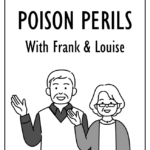What is medication?
Medication is something used to treat, cure or prevent an illness or injury. Some medications are prescribed by a health care provider (doctor, nurse practitioner, physician assistant). Others can be bought without a prescription. These are called over-the-counter medications.
Medication can be harmful if:
- You take medication that isn’t meant for you. For example:
- Taking your friend’s prescription pain medication
- Taking your spouse’s allergy medication
- You take too much medication. For example:
- Giving a child an adult medication
- Taking an extra pain pill
- Taking Tylenol® AND cold medication with Tylenol® in it
- You take medication with food, drink or another medication that changes or strengthens its effects. For example:
- Taking oxycodone and drinking alcohol on the same night
- Taking cholesterol medication and drinking grapefruit juice
- Taking Valium® with Percocet®
- You take a medication that makes a different health problem worse. For example:
- You have high blood pressure and take a cold medication
- You have an allergic reaction to the medication
Medication is the most common cause of poisonings among all age groups.
- Toddlers often medication in their mouths while exploring. Some medication can be very harmful even if the child only eats one pill.
- Young children can also get medication poisoning if adults make mistakes.
- Teens and adults sometimes take medication in the wrong way. It can be by accident, to get high or to hurt themselves.
What are the symptoms of medication poisoning?
Some medications are very dangerous if taken the wrong way. What is safe for one person may be very harmful to someone else. For more information on a particular medication, call the poison center at 1-800-222-1222. We also have information on some medications in our A to Z index.
What can you do about medication poisoning?
If someone has taken a medication in a way that could be harmful, call the poison center at 1-800-222-1222 or chat online. We can also answer other questions you have about medication. If you can, bring the medication bottle or packaging to the phone or computer.
| If someone has passed out or is not breathing, call 911 right away. |
If you know someone who is abusing medication or who is thinking about suicide, get them help. See our substance abuse and suicide pages for resources.
To prevent medication poisonings:
- Always read the label on your medication bottles. It will tell you what the medication is, what it is for, how much to take and possible problems. Check the label each time you take the medication.
- If you have any questions about your medication, ask your doctor, pharmacist or the poison center at 1-800-222-1222.
- Always keep medication in its original container, or in a child-resistant pill reminder box. Never store medication in a household container like a sandwich bag or a film canister.
- If you are taking more than one medication, keep track of them with a written schedule. Also keep a list to share with your doctors and pharmacist.
- Get rid of unwanted or expired medication.
In addition, there specific steps you can take to help prevent medication poisonings among certain age groups.
To prevent medication poisoning in young children:
- Keep medications out of the reach of children, ideally in a locked cabinet. Never leave pills on a counter or table.
- Use a marked measuring tool, like a tablespoon, teaspoon or dropper when you give medication. Do not use silverware.
- Keep track of when the child gets their medication. Talk with other caregivers to make sure the child does not get the medication too often.
- Use medication made for children or talk to your doctor about how much to give the child.
- Do not take medication in front of children. They like to copy others.
- Do not let children play with pill bottles.
- Do not call medication “candy.” Teach kids to only take medication from a trusted adult.
To prevent medication poisoning and abuse in teens:
- Keep medications in a locked cabinet.
- Teach teens to always read the label before using a medication.
- Teach your teen that medication used in the wrong way can be very dangerous. It can harm your body or even kill you.
- Keep track of what medication your teen uses and how much.
- Be a good role model by using medications in the right way.
For more information
Download or purchase our popular booklet, Medication: What You Need to Know.





